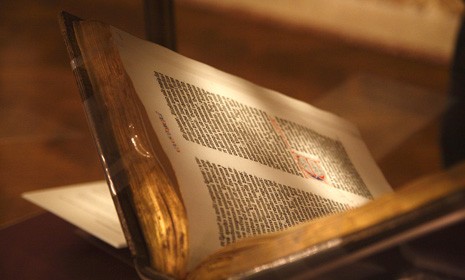Can a computer program reveal the Bible's ghostwriters?
Israeli researchers have created an algorithm that identifies writers based on style — a crucial step toward sorting out the Old Testament's anonymous authors

A free daily email with the biggest news stories of the day – and the best features from TheWeek.com
You are now subscribed
Your newsletter sign-up was successful
The time-honored question "who wrote the Bible?" may soon be answered, thanks to a computer algorithm designed by Israeli researchers to sift through the sacred work's authors. Though it can't determine the writers' names, it can pinpoint slight linguistic changes with astounding efficiency — an important step in figuring out which author wrote which sections. A guide to this development:
How does the program work?
Content-based analysis of the Bible is nothing new, but this software focuses on the authors' styles, looking for the frequency of "function" words, such as prepositions, and other indicators which have "little bearing on the meaning of the text itself," says Science Daily. The differences "could be as innocuous as an author's preference" for words like "said" versus "spoke."
The Week
Escape your echo chamber. Get the facts behind the news, plus analysis from multiple perspectives.

Sign up for The Week's Free Newsletters
From our morning news briefing to a weekly Good News Newsletter, get the best of The Week delivered directly to your inbox.
From our morning news briefing to a weekly Good News Newsletter, get the best of The Week delivered directly to your inbox.
So what did they find after running the program?
Two distinct styles that religious scholars already use as classifications. According to Allison Summers of the Christian Post, the algorithm has organized passages in the first five books of the Old Testament into two types: "priestly" — which characteristically refers to God by "various names" — and "non-priestly," which is less focused on religious rituals.
What can the algorithm tell us?
While the algorithm isn't advanced enough to "give researchers a precise number of possible authors," says United Press International, "it can help to identify transition points where a source changes" — where one writer's work ends and another's begins. Science Daily says that this "Torah algorithm" could also be used to help reveal the authors of other "enigmatic source material" currently "scattered throughout history."
A free daily email with the biggest news stories of the day – and the best features from TheWeek.com
Sources: Christian Post, MSNBC, Science Daily, United Press International
-
 Antonia Romeo and Whitehall’s women problem
Antonia Romeo and Whitehall’s women problemThe Explainer Before her appointment as cabinet secretary, commentators said hostile briefings and vetting concerns were evidence of ‘sexist, misogynistic culture’ in No. 10
-
 Local elections 2026: where are they and who is expected to win?
Local elections 2026: where are they and who is expected to win?The Explainer Labour is braced for heavy losses and U-turn on postponing some council elections hasn’t helped the party’s prospects
-
 6 of the world’s most accessible destinations
6 of the world’s most accessible destinationsThe Week Recommends Experience all of Berlin, Singapore and Sydney